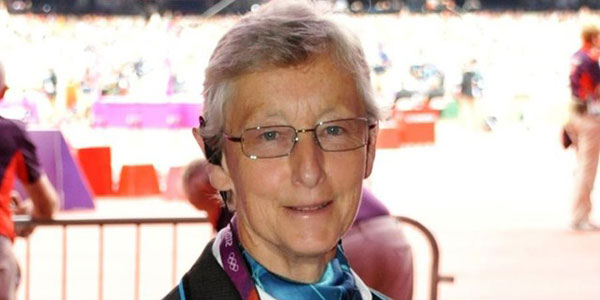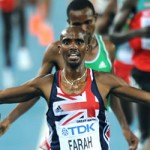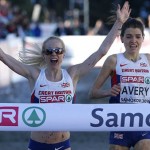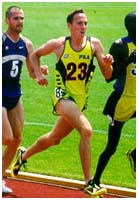Staging athletics meetings is complicated process and one of the trickier aspects is managing the technical officials. It’s a hard enough at local and regional meetings, but Britain’s Moira Gallagher has fulfilled this responsibility with aplomb at no less than the 2012 Olympic Games in London.
It was the pinnacle (so far) of a stellar career in senior officiating and leadership roles that has spanned more than 40 years and led to Moira being named as a winner of the European Athletics Women’s Leadership Award in 2013.
“Moira was Meeting Manager at the London 2012 Olympic and Paralympic Games,” explains Neils de Vos, the Chief Executive of UK Athletics. “It was a time-consuming and complex role, requiring her to work alongside and liaise with the entire team of senior and management officials, but also with the staff of LOCOG (the organising committee) and our federation.
“During the Games, she worked unceasingly to ensure that all officials themselves worked effectively and efficiently, as well as ensuring their welfare and security.”
As big as the task and honor of working at the Games were, they are only a part of what makes Moira Gallagher’s contribution as a leader in the sport so valuable. She is currently the Chair of UK Athletics’ Officials Education and Training Group and a committed mentor to other officials. She is also a coach who specialises in working with Paralympic athletes.
“I was a teacher by profession and taught for 34 years so I have always enjoyed passing on knowledge to other people,” she says. “I have been involved in athletics for many years and I have picked up quite a lot of knowledge during that time! It seems natural to me to offer guidance to those with less experience and it is very satisfying to see them develop within the sport.”
Her knack for educating and leading others has given her a platform to make an impact on sport. One of the best examples has been how she influenced disability athletics. “Early in my officiating career I got involved with the International Stoke Mandeville Games and I helped “persuade” other qualified officials to come and help. This greatly raised the standard of the event, which in turn played a very important part in the development of the Paralympic movement.”
Having turned to officiating after a spell of injury during her own competitive career, Moira refereed her first national level meeting back in 1978 and has gone on to officiate at a number of international events, including the Commonwealth Games in Manchester in 2002, as well as the European Athletics Indoor Championships in 2007, where she fulfilled the role of Track Referee.
Picking an officiating highlight is understandably tough. “It was a great privilege and thrill to work at both the London Olympics and Paralympics,” she says. “It was a pleasure to be a part of the fantastic team of officials who played a very important part in the success of the event. But there have been a lot of highlights for me and it is difficult to be selective!”
Moira’s approach to athletics is simple: it’s about taking commitments seriously, but enjoying the experience and always putting athletes first. “I have been involved in athletics on a voluntary basis for well over 40 years because I enjoy what I do within the sport.
“I take what I do seriously and always try to do the best that I can. As an official I am there to ensure that athletes have the best possible opportunity to take part in fair competition and where discretion is allowed within the rules I apply that in different ways according to the age and experience of the athletes involved. I stress to less experienced officials that although they need to take things seriously and understand and apply the rules correctly, they also need to have a laugh with other officials (Whilst events are not taking place!) and enjoy the experience.”
This approach has not gone unnoticed by colleagues within her national federation, as de Vos confirms: “Moira always puts others first and is always willing to help officials progress by providing mentoring, giving advice and finding appropriate officials to help them. She shows incredible attention to detail, especially when officiating and when giving feedback to those she is supporting. She is well organised and is seen to be good at planning, so that others can see the work needed to succeed. She is always fair and consistent with a clear and direct line of communication.”
While Moira is certain that there is gender equity in the UK as far as officiating is concerned – “There has been gradual evolution to this position over many years and we are now well away from any hint of tokenism” – she still sees the importance of the European Athletics Women’s Leadership Awards.
“It appears that in some countries this is not the situation”, she explains. “Hopefully we will be able to encourage women from those countries to develop confidence in their roles.
“European Athletics is clearly taking very positive steps to encourage women to take on leadership roles within athletics and to help the governing bodies of athletics within each country to think about this. I feel sure that this will have beneficial long term effects.”

































